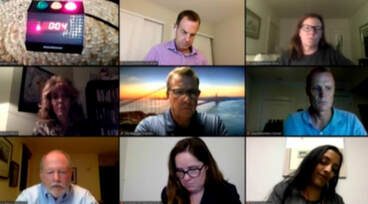 The Mill Valley City Council during its Sept. 8, 2020 meeting.
The Mill Valley City Council during its Sept. 8, 2020 meeting.
But while much of the discussion focused on the quality of the work that DEI Task Force facilitator Dr. Patricia Patton has done to date, and Patton’s stated desire to facilitate “change that is deep and impactful, not just superficial” in Mill Valley, things went a bit sideways early over a pair of issues that intersected with the panel’s purview.
The first was the revelation that Mayor Sashi McEntee had liked a tweet from President Donald Trump on Sept. 5 saying “not anymore,” referring to the federal government’s use of critical race theory in diversity training for employees. Critical race theory is a multi-faceted philosophy built on the idea that the law may play a role in maintaining white supremacy, and to transform the relationship between law and racial power in pursuit of racial emancipation and anti-subordination.
“It is incomprehensible to me why you would continue to like the president’s tweets while you continue masquerading as a mayor who cares about racial inequities,” local resident Lisa Scarsella said of the liked tweet about diversity training for federal employees being “a threat to western civilization.” “I’m concerned that you’re not on the same page as most of us … If you do not even believe that we have a problem, then what is the purpose of your DEI task force?”
Speaker after speaker expressed outrage at the liked tweet, as well as McEntee’s reactions to that outrage throughout the evening. “If it’s a city matter and you’re the mayor of Mill Valley, I suggest you only tweet about local stuff,” Councilmember Jim Wickham said to McEntee. “I don’t care if you tweet but you don’t represent me as a councilmember if you’re liking things that haven’t been brought to our attention.”
Councilmember Urban Carmel said he agreed with Wickham. The City’s social media policy does not include any explicit regulations on the use of social media by individual councilmembers.
“I am very familiar with critical race theory and I’d like to note that I categorically oppose racism and any form of discrimination that is based on immutable characteristics,” McEntee said. “Critical race theory is antithetical to this principle. I understand that people are suffering right now, and I don’t have a problem being somewhat of a focal point for the release of some of that emotion. I am here to do the work.”
The tweet revelation was coupled by discussions about the approval process for public art in the Downtown Plaza, particularly art that speaks to issues of diversity, racial equity and systemic inequality. Attendees noted that while the three free-standing door art pieces installed by artist Zoey Fry and others on the plaza as a way to promote racial justice were approved, a separate piece by Wesley Cabral had not. City Manager Alan Piombo clarified that Cabral’s piece had not gone through the proper channels to receive Arts Commission backing. “If we don’t adhere to a process, it could become a free for all for art that might be more controversial or not acceptable to the broader community,” Piombo said.
“I am committed to making sure that we create a community in Mill Valley community that is just, equitable, inclusive and anti-racist,” Patton said. “We’re in a crucial phase and at a critical time and we can not move backwards. We’re going to pick up speed.”
Patton said she was in the midst of “pulling together the mechanisms for transparency and integrity in deciding who is going to be on that task force,” which will have 20 members and be heavily represented by people identifying with BIPOC backgrounds. Patton emphasized that she is looking for people “who aren’t afraid to speak their truth. We’re all moving in the same direction we just have to get organized.”
Patton noted that the takeaways from those listening sessions spanned an array of subjects, from stories sharied of overt racism as well as micro-agressions to systemic discrimination in areas of housing and police interaction. Patton is forming a selection panel to pick the members of the task force. There won’t be any councilmembers on the task force, she said.
“I was actually pleasantly surprised by Paula and her candor,” said Kress Jack, a longtime local resident, mother of three bi-racial children and founder of Raise the Frequency, a nonprofit that seeks to “to observe the pain of our children and loved ones navigating Mill Valley and the world as people of color.” “I think (Patton) is real and listening.”
Ambatalia owner Molly de Vries, a lifelong Mill Valley resident, joined others in urging McEntee to step down, but also reminded the community how we got here. “None of this would be happening without that initial comment – we have never had such great conversations about real things in this community,” de Vries said. “We’re getting a chance to master this.”
Patton emphasized the need for the process to be driven by the task force members, not her alone. “I’m not coming at this as I’m going to be answering all of your questions and will be the spokesperson for this. That’s where you all come in. That said, I am going to put my all in Mill Valley – I’m eating sleeping and dreaming about Mill Valley. The trust you have placed in me will not be in vain.”
Councilmember John McCauley urged Patton and the task force members to focus on actionable takeaways from its work, keeping in mind the complexities of the multiple jurisdictions for government and law enforcement for a small city surrounded by unincorporated County of Marin neighborhoods within the 94941. For instance, while the Mill Valley Police Department enforces the law within City limits, the Marin County Sheriff’s Office does so within those unincorporated areas.
“I have a strong desire to have a successful outcomes,” McCauley said. “We have no control over the school district or the towns and cities next to us. We don’t provide any social services – the county does that. But we are also a significant influencer of those around us.”
“We need the council to be creative and figure out new pathways and not stay in status quo,” Patton said. “Doing that limits us.”
Carmel agreed on the need for concrete results from the process. “I am looking for meaningful changes that we can make in the very high pressure point areas,” he said. “I need for these ideas to be validated by what has worked in other communities. But this is bigger than the council. We all need to be asking ourselves what we need to be doing to make change in the community.”
Patton said she agreed, but “there is nothing more powerful leadership coming from the elected officials. Your voice can go a lot faster and have such great impact.”

